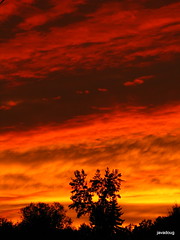The PSO gave a stirring performance of this overture which I've heard before. Manfred Honeck indeed mixed the various instruments in a subtle yet flavourful treat. This is one tone poem I'd recommend to everyone.
I have recently enjoyed watching the movie: "Adventures of Don Juan (1948)" starring Errol Flynn, complete with fencing, court intrigue and an evil Duke to defeat. I daydreamed up images of the scenes from the movie in my mind while listening to the music. It makes for a great amalgamation of visuals to the marvelous symphonic tones of the music being performed live -- somehow better when there is this kind of counterpoint -- as it was for me in my imagination.
It made me think that symphonies like the Pittsburgh Symphony Orchestra ought to try some sort of effort like this to combine the music with something more visual. It's enough for me to view the orchestra themselves, but I often think how much better it would be to add a visual content on occasion. Often venues take old silent films and add live music. Last year, the PSO hosted Cirque de la Symphonie - a truly exciting new concept, and a fabulous way to listen to the beautiful classical music being performed while watching the amazing performances and adept skills of these extremely capable aerial flyers, acrobats, contortionists, dancers, jugglers, balancers and strong men -- that's a good start.
Wouldn't it be great to take a tone poem or overture like Strauss's Don Juan, and combine it with an old movie like the Adventures of Don Juan, I'm not sure how it could be choreographed, but it would certainly be more interesting. Perhaps a series of scenes or stills from multiple old movies spliced in a form that fits the music. Well it's just a thought, or perhaps a hint.
Bela Bartók: Piano Concerto No. 3
 I really enjoyed the overwhelmingly performance given by Yefim Bronfman as piano solo along with Honeck and the PSO. I watch Mr. Bronfman's hands on the keyboard and wonder at the ability.
I really enjoyed the overwhelmingly performance given by Yefim Bronfman as piano solo along with Honeck and the PSO. I watch Mr. Bronfman's hands on the keyboard and wonder at the ability.Sometimes I watch conductor Honeck to see how he synchronizes the performance of the solo with the symphony, it must not be an easy task. For me this is a new piece, and it's always a treat to hear for the first time a performance that I've not yet experienced with the PSO.
Wolfgang Amadeus Mozart: Symphony No. 39
One of my all-time favorite pieces, one that helped introduce me to the wonders of serious classical music. I went into a phase in the past where I seriously considered classical music over pop music, the later growing old with repetition. Classical has the advantage that you can hear something new every day of your life, and you'd never run out. So I went to Monroeville library, which, at the time had a quite extensive collection of old LPs with classical, and listened to as much as I could. I tried to gather every single one of Mozart's Symphonies. My favorite two, if one can chose, would be Nos. 25 and 39. So here I am at Heinz Hall many years later listening to Mozart's fabulous Symphony No. 39 for the very first time live - and it is everything I adored when I first heard this masterpiece.

If you yourself bore of repetitive music, try to experience the depth and breadth, the very wealth of music that classical music represents. It's funny, my daughter tells me that whenever she hears my classical she thinks it's always the same thing, and I ask, does Offenbach's Can Can from Orpheus in the Underworld sound the same as the thunderstorm in Rossini's William Tell overture, or do either sound the same as the Morning Mood of Grieg's Peer Gynt? She knows those three - so I see she smiles - an indication that she knows otherwise - that these pieces are indeed not the same, but of course she has her favorite music, the new pop, just as I did when I grew up. So my advice is to listen and enjoy!
Of note, I read that Tomo Keller of the London Symphony Orchestra was our guest principle violin this last weekend. He did a nice job with the solos in the Don Juan and throughout the performances.
According to the PSO Artistic department, Mr. Bronfman's encore was Frederic Chopin's Etude, Opus 10, No. 12. This is one piece that I've heard before, many times, in popular movies or culture.
When I heard the encore Saturday night, I said to myself: 'that must be Chopin,' but I didn't know which piece. It's a crescendo of impending conclusion, a vibrant theme unmistakable in composition and ripe with finale. And Bronfman played it superbly, with much applause to follow. I hoped for a second encore, but it was not to be.


No comments:
Post a Comment